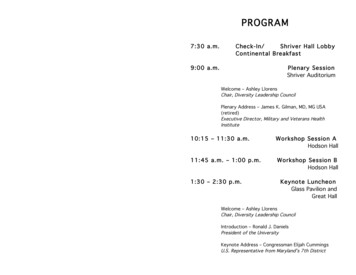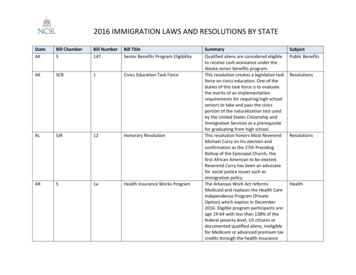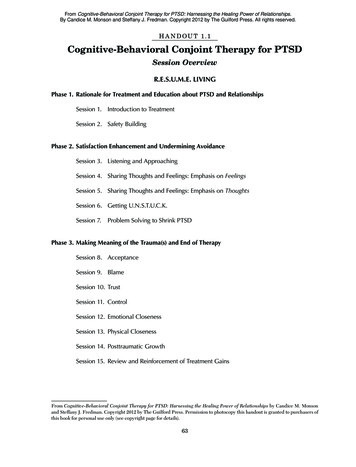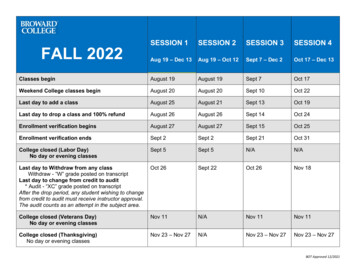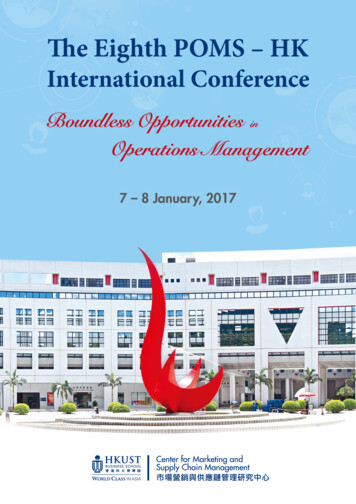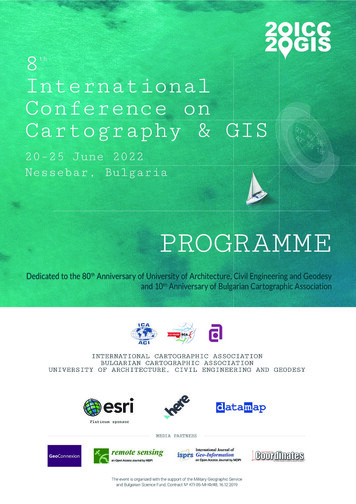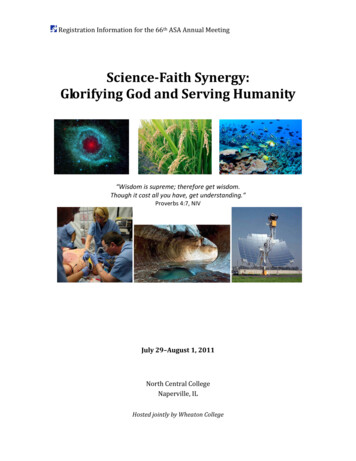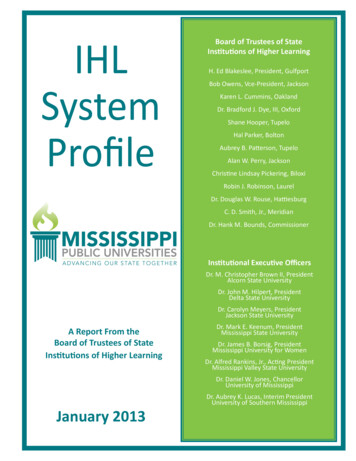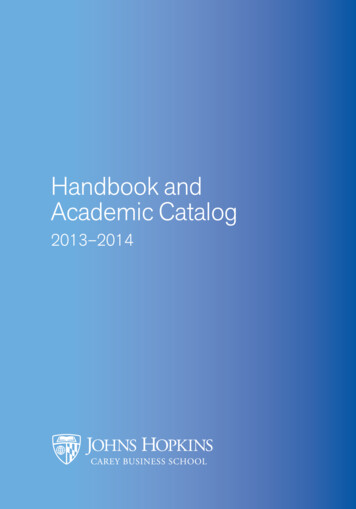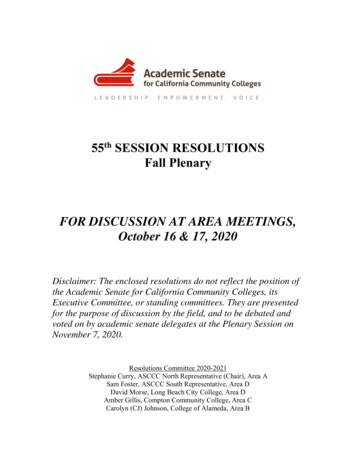
Transcription
55th SESSION RESOLUTIONSFall PlenaryFOR DISCUSSION AT AREA MEETINGS,October 16 & 17, 2020Disclaimer: The enclosed resolutions do not reflect the position ofthe Academic Senate for California Community Colleges, itsExecutive Committee, or standing committees. They are presentedfor the purpose of discussion by the field, and to be debated andvoted on by academic senate delegates at the Plenary Session onNovember 7, 2020.Resolutions Committee 2020-2021Stephanie Curry, ASCCC North Representative (Chair), Area ASam Foster, ASCCC South Representative, Area DDavid Morse, Long Beach City College, Area DAmber Gillis, Compton Community College, Area CCarolyn (CJ) Johnson, College of Alameda, Area B
FALL 2020 VIRTUAL RESOLUTIONS PROCESSIn order to ensure that deliberations are organized, effective, and meaningful, theAcademic Senate uses the following resolution procedure: Pre-session resolutions are developed by the Executive Committee (through itscommittees) and submitted to the pre-session Area Meetings for review.Amendments and new pre-session resolutions are generated in the Area Meetings.The Resolutions Committee meets to review all pre-session resolutions andcombine, re-word, append, or render moot these resolutions as necessary.The resolutions are debated and voted upon in the general sessions on the last dayof the Plenary Session by the delegates.All appendices are available on the ASCCC website.Prior to plenary session, it is each attendee’s responsibility to read the followingdocuments: Senate Delegate Roles and Responsibilities (link in Local Senates Handbook orclick here)Resolution Procedures (Part II in Resolutions Handbook)Resolution Writing and General Advice (Part III in Resolutions Handbook)New delegates are strongly encouraged to attend the New Delegate Orientation onThursday morning during the first breakout session.i
CONSENT CALENDARThe resolutions that have been placed on the Consent Calendar 1) were believed to benoncontroversial, 2) do not potentially reverse a previous position, and 3) do not competewith another proposed resolution. Resolutions that meet these criteria and any subsequentclarifying amendments have been included on the Consent Calendar. To remove aresolution from the Consent Calendar, please see the Consent Calendar section of theResolutions Procedures for the Plenary Session.Consent Calendar resolutions and amendments are marked with an *.Resolutions and amendments submitted on Thursday are marked with a .Resolutions and amendments submitted on Friday are marked with a #.*1.01 S20 Adopt Updated ASCCC Vision, Mission, and Values Statements*1.02 F20 Develop a Resource to Communicate and Encourage Part-time FacultyLeadership*3.01 S20 Support The Anti-Racism Pledge*3.02 S20 Recommendation to Update Title 5 Language for Minimum Qualifications*3.03 F20 Adopt Anti-Racism Education Paper*4.1 F20 Adopt the paper Effective and Equitable Transfer Practices in the CaliforniaCommunity Colleges*6.01 F20 Oppose Legislated Curriculum*9.01 S20 Recommendations for the Implementation of a No-Cost Designation inCourse Schedules*9.02 F20 Bolster the Ethnic Studies Requirement*10.01 S20 Disciplines List—Registered Behavior Technician*10.02 F20 Adopt the Revised and Updated Paper Equivalence to the MinimumQualifications*17.01 F20 Integration of Guided Pathways Work and Institutional Processes andStructures*18.01 F20 Paper and Resources for Evaluating Placement in English, English as aSecond Language, and Mathematics Pathways*19.1 F20 Adopt the Paper Protecting the Future of Academic Freedom in a Time ofGreat Changeii
TABLE OF CONTENTS1.0 ACADEMIC SENATE . 1*1.01F20 Adopt Updated ASCCC Vision, Mission, and Values Statements . 1*1.02 F20 Develop a Resource to Communicate and Encourage Part-time FacultyLeadership . 13.0 DIVERSITY AND EQUITY . 2*3.01F20 Support The Anti-Racism Pledge . 2*3.02F20 Recommendation to Update Title 5 Language for MinimumQualifications . 3*3.03 F20 Adopt Anti-Racism Education Paper. 44.0 ARTICULATION AND TRANSFER . 4*4.01 F20 Adopt the paper Effective and Equitable Transfer Practices in theCalifornia Community Colleges . 46.0 STATE AND LEGISLATIVE ISSUES . 4*6.01 F20 Oppose the Legislation of Curriculum without Inclusion of AcademicSenate Participation . 49.0 CURRICULUM . 5*9.01F20 Recommendations for the Implementation of a No-Cost Designation inCourse Schedules . 5*9.02 F20 Strengthen the Ethnic Studies Requirement . 610.0 DISCIPLINES LIST . 7*10.01 F20 Disciplines List—Registered Behavior Technician . 7*10.02 F20 Adopt the Revised and Updated Paper Equivalence to the MinimumQualifications . 717.0 LOCAL SENATES . 8*17.01 F20 Integration of Guided Pathways Work and Institutional Processes andStructures . 818.0 MATRICULATION . 9*18.01 F20 Paper and Resources for Evaluating Placement in English, English as aSecond Language, and Mathematics Pathways . 919.0 PROFESSIONAL STANDARDS . 9*19.1 F20 Adopt the Paper Protecting the Future of Academic Freedom in a Time ofGreat Change . 9iii
1.0 ACADEMIC SENATE*1.01 F20 Adopt Updated ASCCC Vision, Mission, and Values StatementsWhereas, The Academic Senate for California Community Colleges does not have avision statement, its mission statement was created and adopted by delegates in spring2005 (Resolution 1.03 S05) and has remained unchanged since, and its values statementswere created by the Executive Committee in response to Resolution 1.02 F08 andadopted by delegates in fall 2009 (Resolution 1.02 F09);Whereas, While the current mission and values statements remain relevant, theyinadequately communicate the importance of diverse faculty representation andperspectives and inadequately emphasize student success; andWhereas, Input was solicited in breakouts at plenaries in fall 2018, spring 2019, and fall2019, and participant feedback significantly shaped the draft considered by the ExecutiveCommittee and proposed for adoption by delegates;Resolved, The Academic Senate for California Community Colleges adopt the visionstatement and updated mission and values statements1.Contact: ASCCC Executive Committee*1.02 F20 Develop a Resource to Communicate and Encourage Part-time FacultyLeadershipWhereas, The Chancellor’s Office Management Information System Datamart for fall of2019 indicates that 69.7% of faculty indicated as temporary, which includes part-timefaculty, in the California Community College system are part-time faculty, yet the mostrecent Local Senates survey 2 completed in 2017 by the Academic Senate for CaliforniaCommunity Colleges indicates that 64 colleges indicated that they have part-time facultyserving as local senators;Whereas, The Academic Senate for California Community Colleges has multipleresolutions and papers supporting part-time faculty and the importance of their voice ineffective governance;Whereas, The Academic Senate for California Community Colleges’ Bylaws, Article IV,Section 2 includes eligibility for part-time faculty to run for an Executive Committeeposition (i.e., Board of Directors), yet few part-time faculty have served; andWhereas, in the last few years, approximately 26% of the total applicants interested inserving on statewide committees have been part-time faculty, yet only 15-17% of the1 Proposed ASCCC Vision, Mission, and Values Statement2 Local Senates Survey 20171
appointments to Academic Senate for California Community Colleges’ standingcommittees have been part-time faculty;Resolved, That the Academic Senate for California Community Colleges develop aresource identifying effective practices and providing recommendations to assist collegesand local academic senates in creating and communicating equitable policies and variousleadership opportunities for part-time faculty; andResolved, That the Academic Senate for California Community Colleges widelycommunicate and encourage statewide leadership opportunities available to part-timefaculty and bring the aforementioned resource to the Fall 2021 Plenary Session foradoption.Contact: Steven Chang, Part-time Committee3.0 DIVERSITY AND EQUITY*3.01 F20 Support The Anti-Racism PledgeWhereas, The Academic Senate for California Community Colleges adopted at the FallPlenary of 2019 resolution 3.02 F19, Support Infusing Anti-Racism/No Hate Educationin Community Colleges; andWhereas, The resolution established a commitment for the Academic Senate forCalifornia Community Colleges to “take steps to not only strive for a greater knowledgeabout and the celebration of diversity, but also to support deeper training that reveals theinherent racism embedded in societal institutions, including the educational system, andasks individuals to examine their personal role in the support of racist structures and thecommitment to work to dismantle structural racism”;Resolved, That the Academic Senate for California Community Colleges distribute “TheAnti-Racism Pledge”3;Resolved, That the Academic Senate for California Community Colleges ask faculty andother stakeholders to examine their personal role and commit to dismantle structuralracism by signing “The Anti-Racism Pledge”; andResolved, That the Academic Senate for California Community Colleges, in order towork toward ending institutional discrimination, provide deeper training that reveals andaddresses the inherent racism embedded in societal and educational institutions to facultyby spring of 2021.Contact: Karla Kirk, Equity and Diversity Action Committee3 The Anti-Racism Pledge2
*3.02 F20 Recommendation to Update Title 5 Language for MinimumQualificationsWhereas, The Academic Senate for California Community Colleges adopted a newinclusivity statement in fall 2019—Resolution 3.03 F19, Replacing the Academic Senatefor California Community Colleges Inclusivity Statement—that aligns with the Board ofGovernor’s Diversity, Equity, and Inclusion Statement; 4Whereas, The paper Equity Driven Systems: Student Equity and Achievement in theCalifornia Community Colleges, adopted through Resolution 3.04 F19, calls for theAcademic Senate for California Community Colleges and local academic senates tomove beyond individual actions to transformational system change addressing policiesand procedures;Whereas, Title 5, § 53024.1 acknowledges that “establishing and maintaining a richlydiverse workforce is an on-going process that requires continued institutionalized effort”;andWhereas, Title 5, § 53022 defines the minimum qualifications for all faculty positionsand requires all faculty applicants to demonstrate “a sensitivity to and understanding ofthe diverse academic, socioeconomic, cultural, disability, gender identity, sexualorientation, and ethnic backgrounds of community college students”;Resolved, That the Academic Senate for California Community Colleges work with theCalifornia Community Colleges Chancellor’s Office to recommend changes forconsideration regarding the minimum qualifications that may include an update to theTitle 5, §53022 language to exhibit and reflect the demonstration of cultural humility, 5cultural responsiveness, 6 and equity-mindedness7 that transcend “sensitivity” and furtherdefine the knowledge, skills, and behaviors in the second minimum qualification forfaculty positions.Contact: Luke Lara, Faculty Leadership Development Committee4Vision for Success Diversity, Equity, and Inclusion statement passed by the Board of Governors at its September 17,2019 meeting. BOG/2019/bog-agenda-09-16-172019.ashx?la en&hash 7D1FC0B7B1D994735C9EEF66F407D82D86AE1625Cultural humility is a lifelong commitment to self-evaluation and self-critique, redressing the power imbalances in thestudent-teacher dynamic, developing mutually beneficial partnerships with communities on behalf of individuals anddefined populations. Source: Tervalon M, Murray-Garcia J: “Cultural humility versus cultural competence: a criticaldistinction in defining physician training outcomes in multicultural education, “Journal of Health Care for the Poor andUnderserved 1998; 9(2):117-124. Retrieved from /08/CulturalHumility Tervalon-and-Murray-Garcia-Article.pdf5Culturally responsive teaching recognizes the importance of including students' cultural references in all aspects oflearning, enriching classroom experiences, and keeping students engaged. Retrieved ment/being-culturally-responsive6Equity-mindedness refers to the perspective or mode of thinking exhibited by practitioners who call attention topatterns of inequity in student outcomes. Retrieved from /73
*3.03 F20 Adopt Anti-Racism Education PaperWhereas, The Academic Senate for California Community Colleges adopted Resolution3.02 F19, Support Infusing Anti-Racism/No Hate Education in Community Colleges;Whereas, Recognizing the national history of discriminatory laws and history of racialdiversification and equity efforts in the California Community Colleges system informscurrent faculty diversification and anti-racism efforts; andWhereas, Applying tenets of anti-racism as well as principles for anti-racism professionaldevelopment is critical for recognizing and dismantling racist structures and for buildinginclusive cultures within our colleges;Resolved, That the Academic Senate for California Community Colleges adopt anddisseminate broadly the paper titled Anti-Racism Education in California a CommunityColleges: Acknowledging Historical Context and Assessing and Addressing EffectiveAnti-Racism Practices for Faculty Professional Development.8Contact: ASCCC Executive Committee4.0 ARTICULATION AND TRANSFER*4.01 F20 Adopt the paper Effective and Equitable Transfer Practices in theCalifornia Community CollegesWhereas, Resolution 4.01 S18 directed the Academic Senate for California CommunityColleges to “develop a paper identifying effective practices around transfer to assistcolleges to create and apply uniform and equitable transfer policies and bring the paper tothe Fall 2019 Plenary Session for adoption”;Resolved, That the Academic Senate for California Community Colleges adopt anddisseminate broadly the paper Effective and Equitable Transfer Practices in theCalifornia Community Colleges.9Contact: Lorraine Levy, Transfer, Articulation, and Student Services Committee6.0 STATE AND LEGISLATIVE ISSUES*6.01 F20 Oppose the Legislation of Curriculum without Inclusion of AcademicSenate ParticipationWhereas, Curriculum, especially curriculum that leads to the expansion of requiredcourses and units, should be driven by faculty to meet the educational needs of the8Anti-Racism Education in California a Community Colleges: Acknowledging Historical Context and Assessing andAddressing Effective Anti-Racism Practices for Faculty Professional Development9 Effective and Equitable Transfer Practices in the California Community Colleges4
community it serves with consideration of transfer opportunities and the capacity to hirefaculty in disciplines that could be required due to the legislation;Whereas, Title 5, Division 6 of the California Code of Regulations, established by theCalifornia Community Colleges Board of Governors and including curricularrequirements for the California Community Colleges, has the strength of law;Whereas, The California Community Colleges Board of Governors Standing Orderssection 332 requires that “the advice and judgment of the Academic Senate will beprimarily relied upon whenever the policy involves an academic and professionalmatter”; andWhereas, Efforts to write California community colleges’ curriculum into legislationhave the potential to supersede collegial consultation and the primacy of academicsenates in curriculum recommendations;Resolved, That the Academic Senate for California Community Colleges assert thatcurricular requirements for the California Community College system reside in Title 5,Division 6 of the California Code of Regulations and not in California Education Code;andResolved, That the Academic Senate for California Community Colleges opposelegislation that establishes curriculum for the California community colleges withoutinclusion of the Academic Senate in curriculum and educational program development asspecified in Title 5 53200(c).Contact: Christopher Howerton, Legislative and Advocacy Committee9.0 CURRICULUM*9.01 F20 Recommendations for the Implementation of a No-Cost Designation inCourse SchedulesWhereas, Resolution 13.01 S19 asked that the “Academic Senate for CaliforniaCommunity Colleges develop suggested guidelines, policies, and practices forimplementation of SB 1359 (Block, 2016) no later than Spring of 2020”;Whereas, Most California community colleges have overcome the technical challengesassociated with implementing a “no-cost” designation in their online course schedulesand are now seeking to perfect this implementation by ensuring consistency in the criteriaused to determine which sections are marked with this designation and establishingprocedures to ensure that no qualifying sections are missed;Whereas, The details of the legislation—i.e., the requirement that sections marked withthe no-cost designation be those “that exclusively use digital course materials”—areinconsistent with how “zero textbook cost” had been defined by the CaliforniaCommunity Colleges Chancellor’s Office and do not address how courses that have neverrequired a text, as documented in the course outline of record, should be treated; and5
Whereas, Consistency and transparency across colleges is beneficial to students, faculty,and anyone with an interest in assessing the impact of efforts to reduce textbook costs;Resolved, That the Academic Senate for California Community Colleges recommend thatcolleges implement both of the following:1. a no-cost designation for course sections that require a text but no-cost ispassed on to students and2. a separate designation to recognize those courses that do not require a textand, consequently, have no associated costs for instructional resources;Resolved, That the Academic Senate for California Community Colleges recommend thatthe no-cost designation be used to recognize those sections that use digital resources(consistent with SB 1359[Block, 2016]) and those sections that require a text yet are “nocost” due to something other than a digital alternative;Resolved, That the Academic Senate for California Community Colleges recommendintegration of identification of a course section as being no-cost into the existing textbookselection process; andResolved, That the Academic Senate for California Community Colleges provideadditional guidance and resources related to SB 1359 (Block, 2016) no later than the Fall2020 Plenary.Contact: Michelle Pilati, Faculty Coordinator ASCCC Open Educational ResourcesInitiative*9.02 F20 Strengthen the Ethnic Studies RequirementWhereas, The Academic Senate for California Community Colleges recognizes andembraces the vital role that ethnic studies curriculum plays in all levels of education;Whereas, Title 5 §55063(b)(2) requires that “ethnic studies will be offered in at least oneof the areas required by subdivision (1) [which outlines associate degree generaleducation requirements],” and many colleges have a separate ethnic studies graduationrequirement;Whereas, The Academic Senate for California Community Colleges is deeplyappreciative of the recognition by the legislature that ethnic studies is a crucial element inthe education of California’s community college students, is committed to the principlesof equity and diversity, and understands that an ethnic studies requirement is an essentialtool in achieving those principles; andWhereas, Ethnic Studies is an interdisciplinary and comparative study of race andethnicity with special focus on four historically defined racialized core groups: NativeAmericans, African Americans, Asian Americans, and Latina/o Americans; and;6
Resolved, That the Academic Senate for California Community Colleges work with theCalifornia Community Colleges Chancellor’s Office through existing processes andrecommend updates to the ethnic studies general education requirement in the CaliforniaCode of Regulations, Title 5 §55063.Contact: ASCCC Executive Committee10.0 DISCIPLINES LIST*10.01 F20 Disciplines List—Registered Behavior TechnicianWhereas, Oral and written testimony given through the consultation process used for thereview of Minimum Qualifications for Faculty and Administrators in CaliforniaCommunity Colleges, also known as the Disciplines List, supported the followingaddition of the Registered Behavior Technician discipline:Master's in behavior analysis, education, or psychologyORthe equivalentANDcertification as a Board-Certified Behavior Analyst (BCBA) as set by theBehavior Analyst Certification Board (BACB); andWhereas, The Executive Committee of the Academic Senate for California CommunityColleges has reviewed the proposal and deemed that the process outlined in theDisciplines List Revision Handbook was followed;Resolved, That the Academic Senate for California Community Colleges recommend thatthe California Community Colleges Board of Governors adopt the proposed addition tothe Disciplines List for Registered Behavior Technician. 10Contact: Angela Echeverri, Standards & Practices Committee*10.02 F20 Adopt the Revised and Updated Paper Equivalence to the MinimumQualificationsWhereas, The California Community Colleges Student Success Scorecard reports that in2017 the gulf in completion rates for degree, certificate, or transfer within six years ofentering community college was 30.1 percentage points between the group with thehighest completion rate and the group with the lowest rate;Whereas, The 2016 Academic Senate for California Community Colleges 2016 paperEquivalence to the Minimum Qualifications 11 concludes that “Faculty equivalency to theminimum qualifications should be an uncommon occurrence, but it is an importantmechanism to ensure a diverse group of qualified applicants is considered to engage andenhance student learning,” and at some districts equivalence is seldom or never grantedor is framed in a manner that discourages applicants who might demonstrate equivalence10 Registered Behavior Technician Language11 Equivalency to the Minimum Qulifications (2016)7
from applying despite the mention of equivalence in California Education Code § 87359;andWhereas, The Career Technical Education Faculty Minimum Qualifications Toolkit(2019) provides means to document equivalence to the associate’s degree and is intended“to maximize the flexibility currently allowed in the use of equivalency, thus creating adeep, diverse, and qualified pool of industry-expert candidates”;Resolved, That the Academic Senate for California Community Colleges adopt andbroadly disseminate the revised and updated paper Equivalence to the MinimumQualifications (2020),12 which now clarifies that equivalence is not only legallypermissible but necessary to broadening hiring pools as a means of promoting facultydiversification.Contact: Eric Thompson, Standards & Practices Committee17.0 LOCAL SENATES*17.01 F20 Integration of Guided Pathways Work and Institutional Processes andStructuresWhereas, The funding to support institutional transformation as codified by the CaliforniaCommunity Colleges Guided Pathways [Award] Program is coming to an end, with thefinal allocation of the remaining 10% in July 2021;Whereas, The work of establishing and improving a college’s guided pathwaysframework is integral with all institution-wide work;Whereas, The integration of the college guided pathways framework with collegepractices and processes in areas such as governance, workflow, and responsibilitiesrequires thoughtful, proactive planning that is institution-wide, andWhereas, Key elements for institutional change through a guided pathways frameworkare academic and professional matters as provided for in Title 5 §53200and fall under thepurview of the local academic senate;Resolved, That the Academic Senate for California Community Colleges encourage localacademic senates to work within their local processes to infuse, expand, and integrateguided pathways efforts into institutional structures and practices; andResolved, That the Academic Senate for California Community Colleges provideprofessional development opportunities and resources on topics such as but not limited tocreating integration plans, sharing successful strategies, and identifying challenges toinfuse, expand, and integrate guided pathways efforts into institutional structures andpractices.Contact: Jeffrey Hernandez, Guided Pathways Task Force12 Equivalence to the Minimum Qualifications(2020)8
18.0 MATRICULATION*18.01 F20 Paper and Resources for Evaluating Placement in English, English as aSecond Language, and Mathematics PathwaysWhereas, All placement methods, including the California Community CollegesChancellor’s Office “default placement rules,” must be evaluated regularly for efficacyand bias; andWhereas, Substantial shifts in placement, enrollment, and successful completion havebeen experienced as a result of both full AB 705 (Irwin, 2017) implementation andCOVID-19 pandemic challenges; andWhereas, Local governing boards are to consult collegially with local academic senateson all academic and professional matters, and in particular curriculum, degree andcertificate requirements, grading policies, program development, and standards orpolicies regarding student preparation and success (Title 5 §53200), which are integral todetermining student placement protocols that provides students with the best chance ofsuccess; andWhereas, The Guided Pathways Task Force report Optimizing Student Success: A Reporton Placement in English and Mathematics Pathways13 identified key data elementsassociated with placement data that indicated areas for a more in-depth and collaborativeanalysis;Resolved, That the Academic Senate for California Community Colleges encourage,support, and assist local academic senates in collaboration with their college researchprofessionals to create evaluation plans that examine throughput, student success,persistence, retention, unsuccessful course attempts, and completion with a goal ofoptimizing student success and addressing inequities and achievement gaps amongdisproportionately impacted or marginalized student groups; andResolved, That the Academic Senate for California Community Colleges, incollaboration with system partners, write a paper on optimizing student success byevaluating placement in English, English as a Second Language, and mathematicspathways for consideration at the spring 2022 plenary session.Contact: Lance Heard, Guided Pathways Task Force19.0 PROFESSIONAL STANDARDS*19.1 F20 Adopt the Paper Protecting the Future of Academic Freedom in a Timeof Great ChangeWhereas, Resolution 01.03 F18 directed the Academic Senate for California CommunityColleges “to provide guidance to local academic senates and faculty on safeguardingacademic freedom rights and responsibilities in the current political environment, update13Optimizing Student Success: A Report on Placement in English and Mathematics Pathways9
the 1998 paper Academic Freedom and Tenure: A Faculty Perspective by spring of2020”;Resolved, That the Academic Senate for California Community Colleges adopt andbroadly disseminate the paper Protecting the Future of Academic Freedom in a Time ofGreat Change.14Contact: Wendy Brill-Wynkoop, Educational Policy Committee14 Protecting the Future of Academic Freedom in a Time of Great Change.10
55th SESSION RESOLUTIONS Fall Plenary FOR DISCUSSION AT AREA MEETINGS, October 16 & 17, 2020 . *17.01 F20 Integration of Guided Pathways Work and Institutional Processes and Structures *18.01 F20 Paper and Resources for Evaluating Placement in English, English as a

